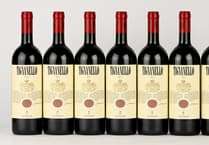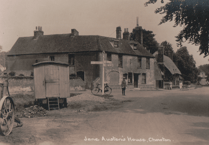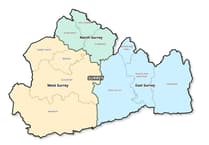MEN of the Home Guard during the Second World War trained and took part in competitions with live weapons, long after the threat of invasion had passed.
News & Mail reader Fred Askew’s father was a member of C Company 11th Battalion (Woking town centre), Surrey Home Guard.
Fred said: “Between Easter and Whitsun of 1944 the south of England was filled with fully trained troops impatient for action. This made a problem for the upper echelons of command to keep these thousands of men keen, therefore various means to achieve this were devised.
“One was a competition for units of the full-time army using weapons previously turned down by that section, but in use by the Home Guard. The Home Guard also took part in the competition.
“The finals were held on the anti-tank range to the south of the Red Road, between West End and Camberley. The weapons were Spigot Mortars, which could be loaded, aimed and fired quickly, giving repeated attacks on a moving tank or vehicle.”
The Home Guard team pictured were adjudged the best bombers on the day.
Fred said: “A pennant to mark their win was presented during a parade at Woking’s Commercial Road car park on the Whitsunday of 1944. It was their final formal parade.
“At the time it was public knowledge that some enthusiasts were happy to keep track of their new-found skills and friendships within the framework of the Guardian Rifle Club.
“What was not generally known was that the work of the local battalion was incomplete. Its personnel provided a security escort service in the goods yard at Woking when hospital trains were transferring prisoners of war into ambulances for their onward journey to St Peter’s Hospital, Chertsey.
“Some of the prisoners did not consider their war to be finished and offered ugly attitudes to the Home Guard. I was told that the ‘old men’ who were suffering abuse and threats had their own way of keeping those prisoners in check.
“Like all armies, the Home Guard needed ready recourse to its ammunition. Secret stores were to be found in many unlikely places. Rifles, ammunition and grenades were to be found in garden sheds and the like, and some spigot mortar bombs were entrusted to the grounds of St George’s House in Wych Hill Lane.
“Out walking with my parents after the standing-down of the Home Guard, my father went off up the footpath then to the side of Blackbridge, returning a few minutes later expressing satisfaction that all was well.
“He had been checking up on the storage of the bombs that were eventually discovered there just a few years ago.
“He had expected that a checking-up and removal by the authorities would take place in due course. It seems that never happened and so many more of them may remain to be discovered.”
If you have some memories or old pictures relating to the Woking area, call me, David Rose, on 01483 838960, or drop a line to the News & Mail.
David Rose is a local historian and writer who specialises in what he calls “the history within living memory” of people, places and events in the west Surrey area covering towns such as Woking and Guildford. He collects old photos and memorabilia relating to the area and the subject, and regularly gives illustrated local history talks to groups and societies. For enquiries and bookings please phone or email him at: [email protected]




